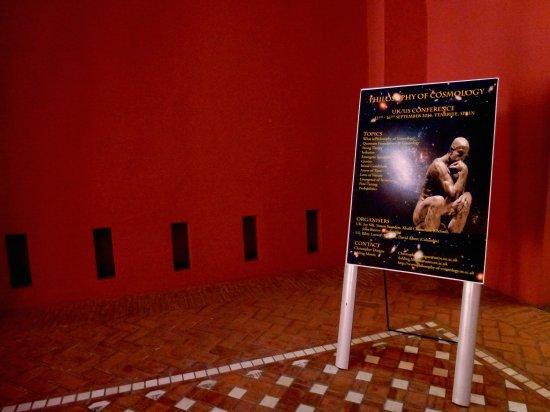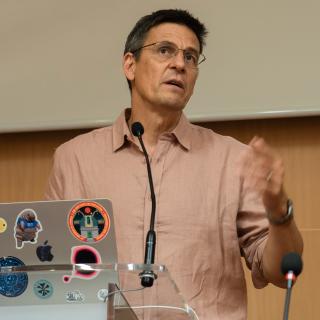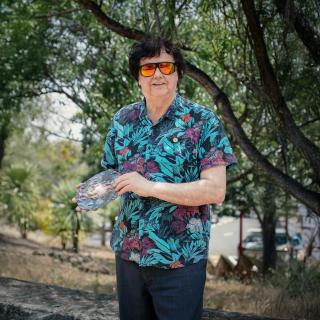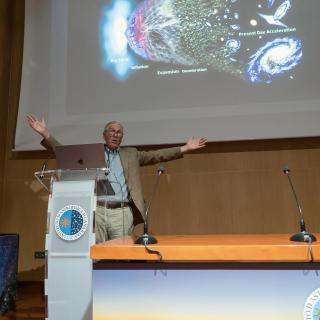MÓNICA SALOMONE
There comes a point where almost all of us set aside-whether we have an answer or not- the existential question par excellence “Why are we here?” But this is not so for the physicists and philosophers who during this week, at the conference “Philosophy of Cosmology” which took place in Tenerife, who discussed whether our universe is unique, or not, if it exists just because, and only because, we observe it, or if our reality is only a tiny part of all that there is. Of course none of this affects our daily lives in any way. Or perhaps it does? It turned out that the most lively debates centred on quantum mechanics, a theory without which we would not have something as everyday as our computers. And one of the conclusions reached was that in spite of the fact that it has been used for over a century with outstanding results, “we still don´t understand quantum mechanics” as these experts said.
There is more than one way to put the question “Why do we exist”: “Why is there something rather than nothing?” “What set off the Big Bang?” or “What was there before the Big Bang?” Few scientists would say that these are not scientific questions. “There are no forbidden questions in science”, says Rafael Rebolo, cosmologist, and director of the Instituto de Astrofísica de Canarias (IAC). The expert in quantum gravity Carlo Rovelli, of the University of Marseille, France, also thinks that scientists should be brave and “try everything”. But whether science obtains a valid answer is another matter.
“It´s interesting that the majority of physicists do not accept the idea that Physics can fully resolve the mystery of existence” says Jim Holt, who authored the essay “Why does the world exist?” (RBA 2013 in its Spanish Edition). “For some people this mystery does not exist. The question of why there is anything is a frivolity which should be left to the mystics. But there is a tiny minority of scientists who do think that existence itself is a mystery, and also that science can resolve it, without resorting to religion or mysticism”.
Holt feels he is closest o the point of view of those who, like Steven Weinberg-Nobel Laureate in Physics and author of the classical popularization book “the first three minutes” think that it is a serious question but cannot be resolved via science. Indeed if anyone could show theoretically that something could emerge from the vacuum (i.e. from nothing) it would still be necessary to explain why that theory is valid but others are not.
Unreachable data
The problem with the question we are considering is basically “How do we obtain data”. For example in order to study the question of why life exists we need to consider its absence, in a completely sterile environment. “But how can we look for non-existence?” This was discussed during the first morning of the conference by George Ellis, a cosmologist from the University of Cape Town (South Africa) a past president of the International Society for Science and Religion, for whom “theories about how the Universe came to exist go beyond the limits of science. We can propose beautiful theories, but we cannot test them because we have only one universe, and no means to compare it with anything.
Ellis, as well as the British mathematician John Barrow, is a winner of the Templeton Prize, an award given by the John Templeton Foundation, for “making advances in research or discovery, in subjects related to spiritual reality” as this organization explains. Barrow, of Cambridge University, is an organizer of the conference, together with cosmologists from the University of Oxford – among them Joe Silk-and the philosophers Barry Loewer and David Albert, of the US universities Rutgers and Columbia, respectively. The John Templeton Foundation funded the meeting and also funds a programme of research into Cosmology and Philosophy, which the organizers are developing.
The inconvenience posed by unreachable data also affects questions other than that of Why do we exist? , such as whether there are other universes, or whether, -as Rovelli
Affirms- other “systems” in the universe for which time is not as we perceive it ourselves, maybe even flowing backwards.
So is there a possibility that in the future we may obtain some kind of evidence which will allow us to infer the existence of other universes? Well, there is an idea which made its appearance quite often during the conference: human perception is limited- it has always been so- and our intuition is also limited, but the history of science shows that both can be augmented. In other words the fact that we are presently unable to receive information from other universes does not necessary imply that this will always be so.
A Century ago the universe as known to human beings did not extend beyond the Milky Way, and was observed only in visible light. There were not infrared telescopes, or radiotelescopes, and a Fortiori no space telescopes observing in X-rays or gamma-rays. At another level, our concept of time has also changed, as has our understanding of reality on the atomic scale. It has not been our perceptions which have warned us that our time changes according to the coordinates in which it is measured, nor our perception which has shown us that on atomic scales amazing phenomena occur such as quantum superposition, which makes it possible for a particle to be literally in two places at once. It is the theory of relativity and quantum mechanics which have shown us these hidden realities, respectively.
And talking of hidden realities, what is dark energy, that ingredient which makes up more than 68% of the Universe, but about which we know nothing except that it causes the Universe to undergo accelerating expansion? Is this dark energy surrounding us, and we don´t even realize it? Ofer Laver, an astrophysicist at University College, London (United? Kingdom) talked about this subject, but he denied the major premise. In his opinion it is not clear whether we need to include this exotic ingredient in the Universe in order to account for its accelerating expansion, or whether we could explain it by modifying the theory of gravity.
“We are not here to understand the Universe”
At all events, does all of this mean that our human perceptive equipment, rather than helping us to understand, simply gets in the way? “A central question in Philosophy of Science is to relate our perception of the world with the image of the world which science gives us” says Loewer. “Intuition isn´t everything, but scientific theories should explain why it does not always work”. Einstein not only discovered the strange behaviour of time, but he also told us why we cannot perceive them directly in daily life.
Maybe intuition has reached where it has reached because we are here only to survive, and not to interpret the Universe? “Maybe”, says Loewer, “but in spite of this it is exciting to find that we can make interpretations, and that we can ask ourselves how the Universe began, and can get to propose ideas about it.
The theme of perception, o to be more precise the “simple” fact that we are conscious, was brought up more than once during the conference. Jim Hartle, a physicist from the University of California, analyzed the question of whether the universe is as it is just because we are unable to perceive another. He warned “the Universe which has the greatest probability to be observed is not necessarily the universe with the greatest probability of existence”. This may appear to be a verbal trick, but it isn´t. It means that our Universe may be a very rare example. Unfortunately, as Hartle said, we cannot know this, because “we cannot observe where we cannot exist”.
“If you find that what I am saying is strange, then you understand me”
So, if we cannot observe these other universes, does it make sense to spend our time thinking about this. This is a doubt put by one of the audience to the talk by the mathematician Shelly Goldstein of Rutgers University, who gave a survey of the different interpretations presently under discussion about quantum mechanics. “Yes, there is a continuing debate, perhaps more now than ever, about the meaning of quantum mechanics”, says Goldstein. “It is by no means clear which version people are applying.
But the theory has been applied for over a century, and works well, so why worry about its deeper meaning. “It is impressive, because it is true that we have a theory which makes exact predictions, and works very well, but what it is telling us is really very unclear. If you find that what I am telling you is strange, that means that you understand me. And why is it important to know what quantum mechanics is saying? Physicists have turned themselves into physicists because they want to understand eh world, isn´t that the case? And it turns out that they don´t even understand the theory which they are using. Of course that´s important!”
The philosopher David Albert agrees with Goldstein. “One of the most obvious cases in which philosophy helps cosmology to understand the universe is the problem of the fundamentals of quantum mechanics. In particular the problem of the measure. Does this imply that the same measurement can give many results and that we as observers are interfering?
When we open the box of Schrödinger´s cat (an imaginary experiment designed to illustrate some of the complexities of quantum mechanics) our brains must divide into two.
It is certain that we interfere when we measure, but there is no agreement about what in fact occurs” says Albert. “The equations of quantum mechanics say that when one measures something you must be in one of those very strange situations in which you have at the same time one solution and another, and all of this is very unclear. There is still no accepted solution to this problem. Our experience of the world is not that when we make a measurement we see a mixture of the two states, but that we see either one or the other.
Anyway, we open the box of Schrodinger´s cat, and finally we know whether it is alive or dead. So what´s the problem? Well, if you apply quantum mechanics to everything, including to our brain, what the theory seems to predict is that when we open the box our brain ought to divide into two, one which sees a dead cat, and another which sees a live cat. But this does not happen. That is why we try to explain that the world appears to choose only one solution. My view is that within 25 years we will have an answer to this” We have to wait.



